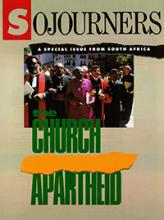Frank Chikane, general secretary of the South African Council of Churches when this article appeared, was interviewed in his home in Soweto.
—The Editors
Jim Wallis: You're now the general secretary of the South African Council of Churches, but it was a long road that brought you to this place. Tell us about your background.
Frank Chikane: I grew up in the Apostolic Faith Mission, a conservative, almost fundamentalist, Pentecostal church which later trained me as a pastor. After my ordination, the church began to accuse me for being involved in politics. I had been asked to address a student conference on Christianity and the political situation, and the press picked it up.
The church council produced its file of press cuttings as evidence against me. I still have the letter which says, "You are suspended from pastoral work because you are involved in politics, because you appeared in the press." I was suspended for one year, from 1981 to 1982; I spent eight months of that time in detention.
After my suspension, I joined the Catholic Institute for Contextual Theology, where I spent five and a half years. That experience was very significant. I had started with a very conservative, highly pietistic theology that could justify and accept the status quo; a pastor's job was to prepare people to go to heaven. But then I was confronted by the reality of the oppressive system, which made me raise new questions that were not answered by my training or tradition.
Read the Full Article
